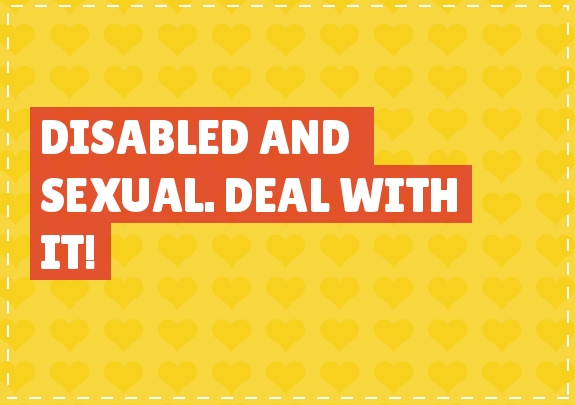
What can persons with disability do and not do? Can they have sex? Should they have sex? However well-intentioned they may be, these questions are themselves flawed because they are rooted in an assumption of lack (of ability, competence, appropriateness, and so on), of something missing, of something being ‘wrong’. Yes, something is definitely wrong, but it’s not within people with disability but rather with the way we perceive them and the ways in which we construct our world to exclude them.
Ruth Gould, Artistic Director of DaDa Fest – the Disability and Deaf Arts Festival, in the interview section tells us about how discovering the performing arts changed her life and the power of the arts to open spaces for people with disabilities and to change how they are represented. All too often, the representations are negative, and as Rupsa Mallik points out in Issue in Focus, policy keeps pace with prevalent social norms to the especial detriment of women with disabilities. But then again, small steps can lead to big changes, and Rupsa offers examples of innovative ways of doing this.
In the Voices section, we have a range of articles highlighting the cracks and loopholes in the hetero-normative, patriarchal, ‘able’ body mind-set reflected in many societies around the world. However, we also see people living with disabilities fighting for their rights and in the process bridging the gap between what has been done and what needs to be done to work towards an equal and just society. Mostly no one would quarrel with working towards a just society. But what about sexual justice? Can people with disabilities have sex? How do they arrange it? Can they buy sex? Should they?
Society would rather have people with disabilities and sex workers hidden away somewhere, be made even more invisible than they already are. What happens when they come together?
Rachel Wotton shares her experiences as a sex worker with clients living with disabilities in Australia and overseas and makes an impassioned claim for their right to sexual expression just like anyone else. As she says, ‘What we take for granted and is a spontaneous act is an orchestrated moment in some peoples’ lives… but that is no reason to ever deny people the opportunity to experience such things if they so choose.’
You may have heard of the documentary Scarlet Road, based on Rachel’s work. We have a review of Scarlet Road by Zulfiya Hamzaki in this issue of the blog. Speaking of films, Shweta Ghosh writes about her debut documentary film ‘Accsex’ that explores notions of beauty, body, sexuality and ‘ability’ through the narratives of four women living with disabilities in India.
As Shampa Sengupta highlights, it is true that we are faced with a failure at the institutional as well as societal level to provide basic sexual and reproductive rights to women living with disabilities. She advocates for change at the grassroots levels to rectify this.
We’re happy to be expanding our horizons this month – we have two articles from the African continent. Shantha Rau Barriga, from Human Rights Watch, shares with us an excerpt of their recently released report ‘We Are Also Dying of AIDS’ on the inclusion of people living with disabilities into HIV education and health services in Zambia, Africa and on the need to address their sexual and reproductive health rights.
Staying with Africa, we have an account of history in the making, by Janet Price, about her experiences of a meeting with fellow sexuality, gender and disability rights activists in Malawi to set up an African Coalition on Disability, Gender, Sexuality and Rights.This article is in two parts, the second of which will be published on August 15th.
And sometimes something as simple as ‘going for a walk’ can lead to unexpected discoveries of the possibilities that exist for us to live together in true mutuality, as Parigya Sharma shows in her article about the walk that disability activist Sunaura Taylor and post-structuralist philosopher Judith Butler took through the streets of San Francisco.
In the I Column, Malini Chib, a disability rights activist and author, writes about sex, love and relationships for a woman living with disabilities.
Shalini Khanna reviews TARSHI Talks, a ‘talking book’ with reliable and accurate information on sexuality and relationships presented in a matter-of-fact, friendly and non-judgmental way.
In the video section, we have videos made by Point of View, Mumbai in collaboration with SANGRAM about the lives of sex workers living with disabilities from Veshya Anyay Mukti Parishad [VAMP] in Maharashtra, India.In the Hindi Section, we have Prachi Srivastava, a consultant psychologist, advocating for the need of sexuality education for children and young people living with disabilities. She talks about her experience of working in a school for children and young people living with disabilities.This article has been translated into Hindi by Dipika Srivastava, TARSHI.
In Brushstrokes we share a poster showcasing wheelchair sex positions featured on sexualityanddisability.org.
The FAQs section busts myths about sexuality and disability. The innovations corner has an interesting disability friendly tool – a menstrual kit for visually impaired girls by Menstrupedia. Know more about ‘TARSHI Talks’ – a ‘talking book’ on sexuality and relationships for people with print disabilities, the Sexuality and Disability working paper and other programmes related to sexuality and disability that TARSHI is involved in at TARSHI’s Corner.
As always, we’ll have more content in the blog roll section on the 15th of the month so do come back to read articles sourced from other blogs as well as the second part of Janet Price’s article.
Pic Source: Ankit Gupta